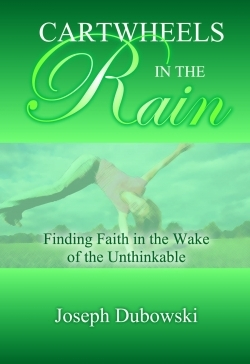Cartwheels in the Rain
Finding Faith in the Wake of the Unthinkable
In February 2008, Joseph and Laurel Dubowski lost their twenty-year-old daughter, Gayle, when a gunman on the campus of Northern Illinois University went on a rampage inside a classroom. In one of his recollections of Gayle, her father recalls that she used to love the rain so much that she’d do cartwheels in a downpour.
That type of exuberance is what the family chose to remember, not her tragic end, and first-time author Joseph Dubowski draws on that quality to fuel this touching book about finding a way through grief. The story is about more than surviving and living with loss, he notes, and about more than the impact of “one brief, humble life on a family and the world.” It’s a lively manifesto about holding onto faith, working through pain, and finding inspiration even when an emotional storm threatens to wash everything away.
Dubowski begins the book with a harrowing account of the shooting and the hours after it took place, while he and other family members were waiting for news. After his daughter’s death was confirmed, he remembers thinking about the twenty years that he had with Gayle, from her first moments as a baby to her sweetness as a child. He offers numerous details about her personality, both as a celebration of her life and a way to pay homage to an obviously compassionate, sunny girl who is dearly missed.
As he goes through the funeral and faces life without his daughter, the author begins to truly reflect on his relationship with Gayle. He thinks about all of the experiences that they will never share, like holidays and birthdays, or walking down the aisle together at her wedding. As time passes, his grief deepens into a kind of wracking, difficult journey that robs him of sleep and tests his faith in God.
Dubowski’s unflinching honesty in recounting his struggles is poignant and, many times, heartbreaking. Although he ultimately grows closer to God and finds a measure of peace through communicating his feelings, he makes it clear that grief is a long, uneven process in which “progress” is not clear.
“The event that forever changed our lives happened unexpectedly and with great suddenness, and it left us feeling traumatized,” he writes. “But, the healing and transformation that followed over the past two years was much slower, gentler—at times, it seemed, imperceptible.” With the benefit of time, Dubowski can better see what Gayle taught him through living, and, most compellingly, through dying.
Reviewed by
Elizabeth Millard
Disclosure: This article is not an endorsement, but a review. The publisher of this book provided free copies of the book and paid a small fee to have their book reviewed by a professional reviewer. Foreword Reviews and Clarion Reviews make no guarantee that the publisher will receive a positive review. Foreword Magazine, Inc. is disclosing this in accordance with the Federal Trade Commission’s 16 CFR, Part 255.

